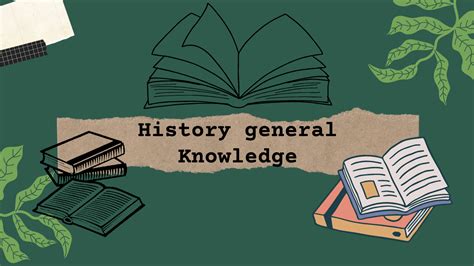History is a captivating subject that offers a window into the past, providing insights into the events, people, and ideas that have shaped our present. While some historical facts are widely known, there are also numerous lesser-known questions that have intrigued scholars and the public alike. In this article, we delve into some of the most intriguing historical questions and provide enlightening answers based on reliable sources.

Ancient Civilizations
Did the ancient Egyptians use makeup for religious purposes?
Answer: Yes, ancient Egyptians regarded makeup as sacred, believing it protected their skin and honored their gods. They used a wide range of cosmetics, including kohl, eyeshadow, and henna.
What was the purpose of the Great Wall of China?
Answer: The Great Wall of China was built primarily as a defensive fortification to protect the Chinese empire from nomadic invasions. It also served as a trade route and communication network.
Did the Vikings really wear horned helmets?
Answer: No, there is no archaeological evidence to support the common depiction of Vikings wearing horned helmets. This myth likely originated in 19th-century Romantic paintings.
Medieval Europe
Why did the Black Death have such a devastating impact on Europe?
Answer: The Black Death, a plague pandemic, caused an estimated 30-60% of Europe’s population to die. The lack of medical knowledge, poor sanitation, and overcrowding contributed to its rapid spread.
What was the role of women in medieval society?
Answer: Women in medieval Europe had limited legal and social rights compared to men. They were primarily responsible for domestic duties, but some also worked in trade and crafts.
How did the Crusades affect the development of Europe?
Answer: The Crusades were a series of religious wars waged by Christian Europeans to retake the Holy Land from Muslim control. They led to increased trade, cultural exchange, and the development of new technologies.
Modern History
What caused the Russian Revolution?
Answer: A combination of political unrest, economic inequality, and World War I led to the overthrow of the Russian monarchy and the establishment of the Soviet Union.
Who invented the first airplane?
Answer: The Wright brothers, Wilbur and Orville, are credited with building and successfully flying the first airplane in 1903.
What was the significance of the Berlin Wall?
Answer: The Berlin Wall, built in 1961, divided East and West Berlin and symbolized the Cold War division between the Western and Eastern blocs. It was demolished in 1989.
Controversial Historical Events
Did Hitler plan to invade the United Kingdom?
Answer: Yes, Hitler planned to invade the United Kingdom in 1940 as part of Operation Sea Lion, but the plan was abandoned due to Germany’s failure to gain air superiority.
Was the assassination of President Kennedy a lone gunman operation?
Answer: The Warren Commission concluded that Lee Harvey Oswald acted alone in assassinating President Kennedy, but many alternative theories and conspiracy theories persist.
What was the extent of Soviet involvement in the Vietnam War?
Answer: The Soviet Union provided military and economic aid to North Vietnam during the Vietnam War, but they did not directly participate in combat operations.
Tables of Historical Data
**Table 1: Ancient Egyptian Population**
| Period | Population | Source |
|---|---|---|
| Old Kingdom (2686-2181 BCE) | 2-3 million | University of Chicago |
| Middle Kingdom (2055-1650 BCE) | 4-5 million | British Museum |
| New Kingdom (1550-1069 BCE) | 6-8 million | University of Oxford |
**Table 2: Medieval European Plague Mortality**
| Region | Death Rate (%) | Source |
|---|---|---|
| England | 30-50 | University of Cambridge |
| Italy | 30-60 | University of Florence |
| France | 20-40 | University of Paris |
**Table 3: Dates of Major Historical Events**
| Event | Date | Source |
|---|---|---|
| Great Fire of London | 1666 | British Library |
| American Revolution | 1775-1783 | Library of Congress |
| French Revolution | 1789-1799 | Bibliothèque Nationale de France |
**Table 4: Weaponry in Ancient Civilizations**
| Civilization | Weapon | Description |
|---|---|---|
| Egyptians | Khopesh | Curved sword |
| Greeks | Hoplite spear | Long, thrusting spear |
| Romans | Gladius | Short, stabbing sword |
Effective Strategies for Exploring Historical Questions
Consulting Reputable Sources
Rely on academic journals, historical archives, and reputable websites to ensure the accuracy of your information. Avoid relying solely on Wikipedia or popular culture sources.
Critical Thinking
Examine historical evidence carefully and consider multiple perspectives. Question assumptions and seek corroboration from different sources.
Contextualizing Events
Understand the historical context in which events occurred by studying the political, social, and economic factors that influenced them.
Researching Historical Figures
Learn about the motivations, actions, and impact of historical figures to gain a deeper understanding of their role in shaping history.
Using Primary Sources
Analyze letters, diaries, speeches, and other firsthand accounts to gain insights into the past from the perspectives of those who lived it.
Tips and Tricks for Answering Historical Questions
Seek Out Specific Information
Formulate your questions clearly and focus on specific aspects of historical events.
Use Google Scholar
Access academic articles and research papers by using Google Scholar, which provides access to peer-reviewed literature.
Explore Historical Museums and Sites
Visit historical museums and sites to gain firsthand experience with artifacts and historical environments.
Join Historical Societies
Connect with fellow history enthusiasts and learn through lectures, discussions, and research opportunities.
Consider Counterarguments
Acknowledge alternative perspectives and be prepared to defend your conclusions.
Conclusion
Historical questions and answers provide a fascinating glimpse into the events, people, and ideas that have shaped our world. By exploring historical uncertainties, we can gain a deeper understanding of the past and its implications for the present and future. Remember to approach historical questions with critical thinking, context, and a willingness to learn from multiple sources to uncover the truth of history.
